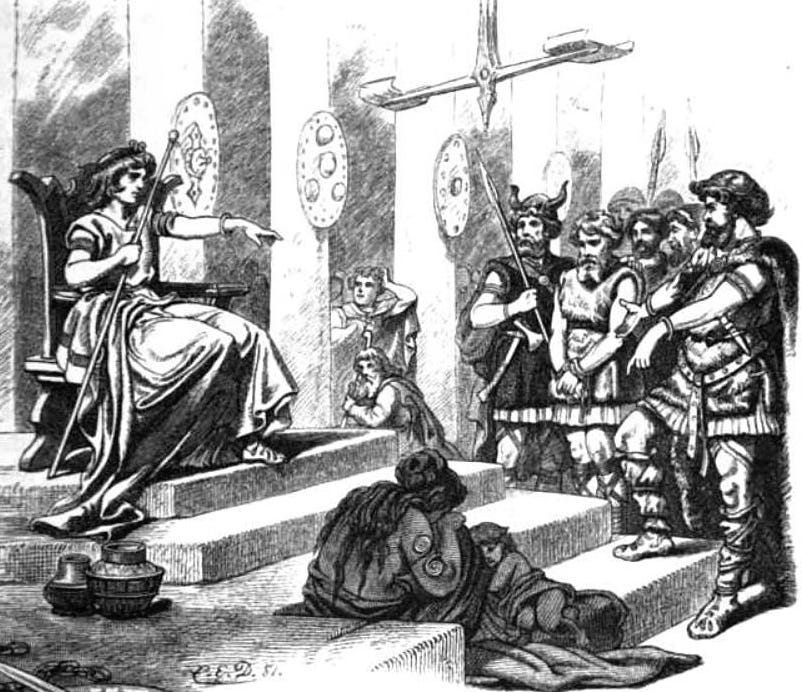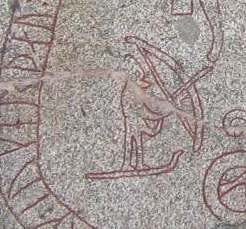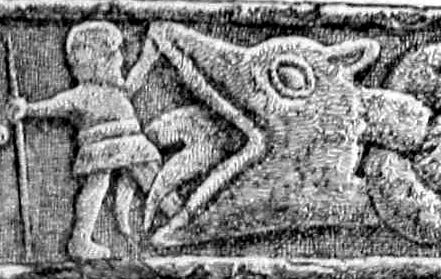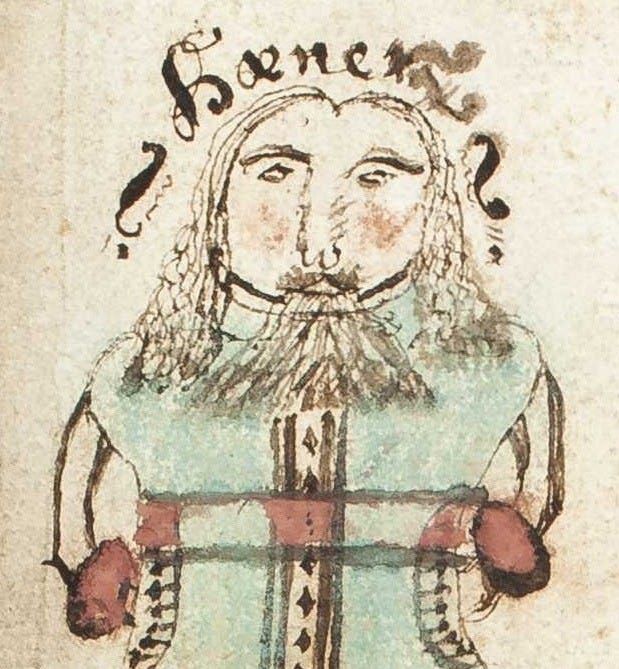Forgotten gods: eight hidden characters in Norse mythology
Beyond Thor's hammer and Odin's ravens lies a pantheon of extraordinary deities waiting to be rediscovered
When most people think of Norse mythology, their minds leap to the usual suspects: Thor with his mighty hammer, Odin the All-Father, Loki the trickster. But here's the thing - limiting ourselves to these Hollywood favourites is like judging a symphony by its opening note. The Norse mythological universe is far richer and stranger than we've been led to believe, populated by gods whose stories are every bit as compelling as their famous relatives.
Today, we're diving into the shadows of Asgard to meet eight fascinating deities you may not have heard of but absolutely should.
Höd: the tragic pawn who changed everything
Let's start with perhaps the most heartbreaking figure in all of Norse mythology: Höd, the blind god who killed his own brother.
Picture this: Baldr, the golden god beloved by all, has been having nightmares about his death. In response, the gods make him invincible: every creature and object in existence swears an oath not to harm him. Naturally, this becomes the ancient equivalent of a party game, with gods hurling weapons at Baldr just to watch them bounce off harmlessly. Enter Loki, who discovers that one tiny plant, mistletoe, never took the oath. He crafts a spear from it and hands it to Höd, Baldr's blind brother, guiding his aim. The shot flies true, Baldr falls dead, and the golden age of the gods comes crashing down.
But here's where it gets interesting: in the oldest versions of this story, there's no mention of Höd being blind or Loki's involvement. Those details were added later by Snorri Sturluson, possibly to make Höd more sympathetic. In Saxo Grammaticus's version, Höd (called Hotherus) is a warrior king who defeats the gods in battle and even breaks Thor's hammer before ultimately killing Baldr in single combat.
The most fascinating detail? Despite being Baldr's killer, Höd is one of the few gods destined to survive Ragnarök and help rebuild the world, suggesting that even the gods recognise his essential innocence in the cosmic tragedy.
Magni: the three-day-old strongman
Thor's son Magni might just be the most ridiculously overpowered character in all mythology. When we first meet him in the stories, he's exactly three days old. Three. Days.
After Thor's epic battle with the giant Hrungnir, our thunder god finds himself pinned beneath the enormous leg of his fallen foe. All the other gods try to free him, but the leg won't budge. Then tiny Magni shows up, casually tosses the giant's leg aside like it's a pool noodle, and delivers the kind of one-liner that would make Arnold Schwarzenegger proud: "What a pity, father, that I came so late; I think I could have smacked the giant down into Hel with my fist."
This infant superhero is destined to inherit Mjöllnir after Ragnarök, along with his brother Módi. They represent the new generation of gods who will reshape the post-apocalyptic world, proving that sometimes the apple doesn't just fall close to the tree, it demolishes everything in a ten-mile radius.
Forseti: the divine judge nobody talks about
Baldr's son Forseti might be the most underrated god in the entire pantheon. While his father gets all the attention for being beautiful and dying tragically, Forseti quietly runs what amounts to a cosmic Supreme Court.
His hall, Glitnir, has a silver roof and golden pillars, and here's the catch: every single legal dispute brought before him gets resolved to everyone's satisfaction. Every. Single. One. In our age of endless litigation and political gridlock, Forseti's perfect track record seems less like mythology and more like wishful thinking.
The modern Icelandic word for "president" is forseti, which tells you everything you need to know about how this god's reputation has endured. He's the patron saint of everyone who's ever wished politicians could just sit down and work things out like adults.
Ull: the winter sports champion of Asgard
Meet Ull, the Norse god who would absolutely dominate the Winter Olympics if he were around today. This bloke is described as the ultimate archer and skier, so good that literally no one can compete with him. He's basically Legolas meets Ingemar Stenmark, with a side of Bear Grylls.
But Ull's story gets weird. Despite being mentioned frequently in Scandinavian place names (suggesting he was once hugely important in some regions), he's barely a footnote in the surviving myths. One tantalising detail: shields were sometimes called "Ull's ships," hinting that he might have been the world's first snowboarder, using his shield to surf across the winter landscape. Just joking, poets loved playing with words, though.
Even stranger, Saxo Grammaticus tells us that Ull once temporarily replaced Odin as king of the gods and could travel across oceans on a magical bone. The lad's clearly got skills, but like many Norse deities, his full story has been lost to time, leaving us with only frustrating glimpses of what must have been epic adventures.
Kvasir: the god whose murder created poetry
Here's a creation myth that's equal parts beautiful and horrifying: after the war between the Æsir and Vanir gods ended, both sides literally spat into a cauldron as a peace gesture. From this divine saliva, they created Kvasir, a being so wise he could answer any question in existence. Naturally, he gets murdered by dwarves.
Fjalar and Galar kill Kvasir and mix his blood with honey, creating the mead of poetry. Anyone who drinks it becomes a master poet and scholar. When the other gods ask what happened, the dwarves claim Kvasir "choked on his own wisdom", which has to be one of the most passive-aggressive lines in mythological history.
The story gets even better: the mead eventually falls into Odin's hands after a complex heist involving shape-shifting, seduction, and enough double-crossing to fuel a Netflix series. Every time you read a beautiful poem or clever turn of phrase, you're experiencing the legacy of Kvasir's sacrifice.
Vidar: the silent avenger
They call Vídar "the silent god," and he might be the most metal deity in the entire Norse pantheon. While other gods are busy making speeches and boasts, Vídar just quietly prepares for the end of the world.
His main claim to fame? He's the one destined to kill Fenrir the wolf during Ragnarök. And here's how he does it: Vídar wears a special shoe made from scraps of leather that people have thrown away throughout history. When Fenrir devours Odin, Vídar steps on the wolf's lower jaw with this magical boot and tears the beast apart with his bare hands.
This is Norse mythology at its most beautifully weird - the idea that every discarded shoe sole throughout history is unconsciously contributing to a cosmic act of vengeance. Vídar embodies the Norse concept that justice might be delayed, but it's absolutely inevitable.
Hoenir: the god who couldn't make decisions
Hœnir is fascinating precisely because he's so frustratingly vague. He's present at virtually every major moment in Norse mythology: helping create the first humans, travelling with Odin and Loki on their adventures, surviving Ragnarök, yet his actual personality remains maddeningly elusive.
The most telling story about Hœnir comes from the god exchange after the Æsir-Vanir war. The Æsir send him to live with the Vanir as a hostage, along with the wise Mímir. Hœnir seems impressive at first: tall, handsome, apparently leadership material. But whenever he's asked to make a decision without Mímir's counsel, he just shrugs and says, "Let the others decide."
The Vanir quickly realise they've been tricked, so they decapitate Mímir and send his head back to Odin (who preserves it as an oracle). Poor Hœnir survives this diplomatic incident and makes it through Ragnarök, where he'll apparently spend eternity making divination with wooden lots, probably still avoiding any real decision-making.
Mimir: the talking head of infinite wisdom
Mímir's story reads like the premise of a particularly dark fairy tale. Originally one of the Æsir gods, he becomes the guardian of a well beneath the world tree Yggdrasil. This isn't just any well; it contains wisdom and knowledge itself.
When Odin comes seeking wisdom, Mímir demands the ultimate price: one of Odin's eyes. The All-Father pays it, dropping his eye into the well as payment for a drink from the waters of knowledge. But that's not even Mímir's strangest moment.
Later, after the god exchange goes wrong and the Vanir decapitate him, Odin preserves Mímir's head with herbs and magic. The head continues to speak, offering counsel and revealing secrets. Imagine having a ball like the one in Cast Away, but this one is magical and knows everything, and it also talks back and probably has strong opinions about your life choices.
Mímir represents the Norse obsession with wisdom and memory, the idea that knowledge is worth any sacrifice. His well sits at the literal centre of the cosmos, making him perhaps the most important god you've never heard of.
Why these gods matter
These forgotten deities reveal something crucial about Norse mythology: it was never just about warfare and dramatic deaths and it was never a straightforward collection of stories. These tales explore concepts that feel remarkably modern: the nature of justice, the price of wisdom, the weight of unintended consequences, the complexity of heroism. At the same time, it is safe to assume a lot of traditions faded into oblivion, as most of these very specific myths that got written down and “archived” were the narrative choice of the monks who heard them, especially of our heathen culture enthusiast Snorri Sturluson, who wrote the Prose Edda. The Poetic Edda is, on that account, much more obscure.
Nonetheless, each of these gods would have filled a role in the Norse understanding of how the universe works. They might have been more than colourful characters - perhaps aspects of human experience given divine form, helping ancient people (and modern readers) make sense of a complex and often unfair world.
The next time someone brings up Norse mythology, you'll have eight compelling stories to share, tales that are every bit as engaging as anything Marvel has cooked up, with the added benefit of being thousands of years old and still relevant today.
What other "forgotten" mythological figures do you think deserve more attention? Share your favourites in the comments!
If you prefer watching a video instead of reading, there’s one for you as well:









Great piece! Thanks for writing this and helping to fill in the gaps in our knowledge.
I'd be very interested to learn more about the differences in what we are told by Snorri and Saxo and why they exist. Sources? Motives? Location? Saxo always sounds so fabulous but maybe it reflects genuine traditions that lost out over time?
I will admit that I am disappointed that Tyr did not make this list.
While he literally has a day of the week named after him, I am fairly certain that everyone else on this list has at least a story or two more told about them.
I have read that as an initially Germanic sky god, the rise of Wotan in his stead might be seen as a political movement, or the two ideas combined into one. Insert new sky god, continue as appropriate.
However, his importance in the Fenrir debacle mostly led to, " he did the right thing, lost a hand, and then died later and nobody paid attention."
This saddens me for some truly fundamental reasons.